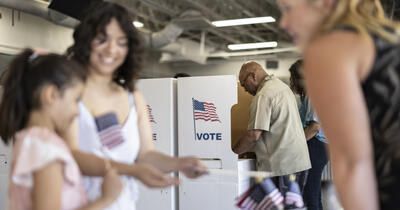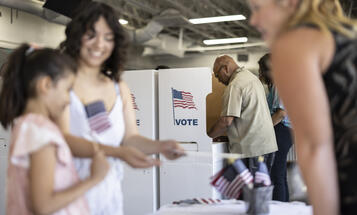
After Victories in New Mexico and Minnesota, We Need Federal Action on Voting Rights
These wins are a reminder to the nation that rights for some but not for all is not how we build an inclusive democracy.

[T]hanks to the tireless efforts of grassroots organizers, this March offered two signs of state level progress toward protecting and expanding our democracy[.]
The ten years since the Supreme Court gutted the Voting Rights Act in Shelby v. Holder have been a decade of disenfranchisement. In 2022 alone, 408 anti-voter bills were proposed across the country, disproportionately impacting Black and brown voters. But thanks to the tireless efforts of grassroots organizers, this March offered two signs of state level progress toward protecting and expanding our democracy, especially in terms of restoring ballot access for people involved in the criminal legal system. These efforts are a blueprint for what we deserve: federal action to preserve and expand voting rights for all Americans.
On March 3, Minnesota Gov. Tim Walz signed the Restore the Vote Act, which reinstates the right to vote for approximately 50,000 Minnesotans who are on parole or probation. Previously, people convicted of a felony had to complete years or even decades of probation before they could cast a ballot. Going forward, we’re working towards a democracy where all court-involved people can vote, even while they’re incarcerated.
New Mexico’s legislature rectified generations of disenfranchisement by adopting the New Mexico Voting Rights Act, signed by Gov. Michelle Lujan Grisham on March 30. The Act enables people who are on probation or parole to vote, immediately restoring this right to about 11,000 New Mexicans.
In addition to enfranchisement for court-involved individuals, New Mexico’s law strikes down barriers for Native people to vote by reducing the distance between polling places on Native land, among other improvements—vital correctives, considering that Native people living on reservations were forbidden to vote until 1948. The law also makes Election Day a holiday, enables New Mexico to provide more drop boxes, and establishes automatic voter registration and a permanent list of absentee voters, among other measures.
These laws represent years of coalition building, advocacy, and organizing from grassroots groups across both states, including our Inclusive Democracy Project partners Take Action Minnesota and Organizers in the Land of Enchantment (OLÉ New Mexico). “More than a decade of organizing from Black leaders and a multiracial coalition delivered this win for our democracy,” TakeAction Minnesota said.
[E]ven as we celebrate the visionary organizing that produced these state level wins, democracy requires more than a piecemeal approach.
But even as we celebrate the visionary organizing that produced these state level wins, democracy requires more than a piecemeal approach. Voting rights should not be decided by a confusing patchwork of state laws. For example, only two states, Maine and Vermont, allow all residents with felony convictions to vote, even while incarcerated. Two others, Virginia and Kentucky, have lifetime voting bans for residents convicted of a felony, unless they get individual permission from the state. Kentuckians may get a reprieve; in February, the state legislature introduced a bill that would allow Kentucky residents to vote on a constitutional amendment restoring voting rights for people who have been convicted of a felony.
Rights for some but not for all is not how we build an inclusive democracy. Everyone, including people involved in the criminal legal system, should have their right to vote assured and codified from coast to coast by federal legislation. The path to a just, inclusive, multiracial democracy is through the polling place. We must fight to make it accessible to every qualified voter. The federal government must take action to ensure that every voter, in all states, can fully participate in our democracy.




